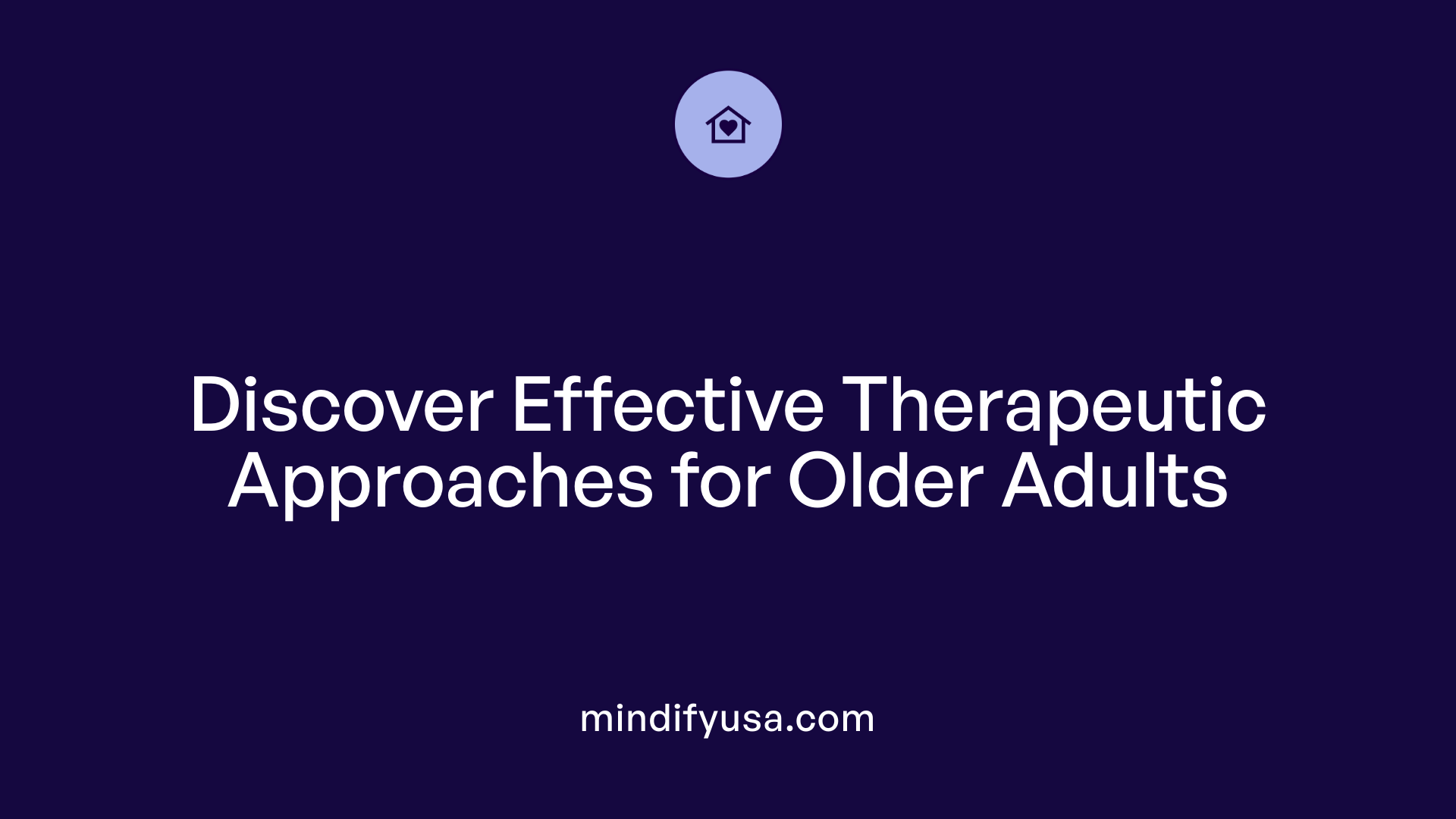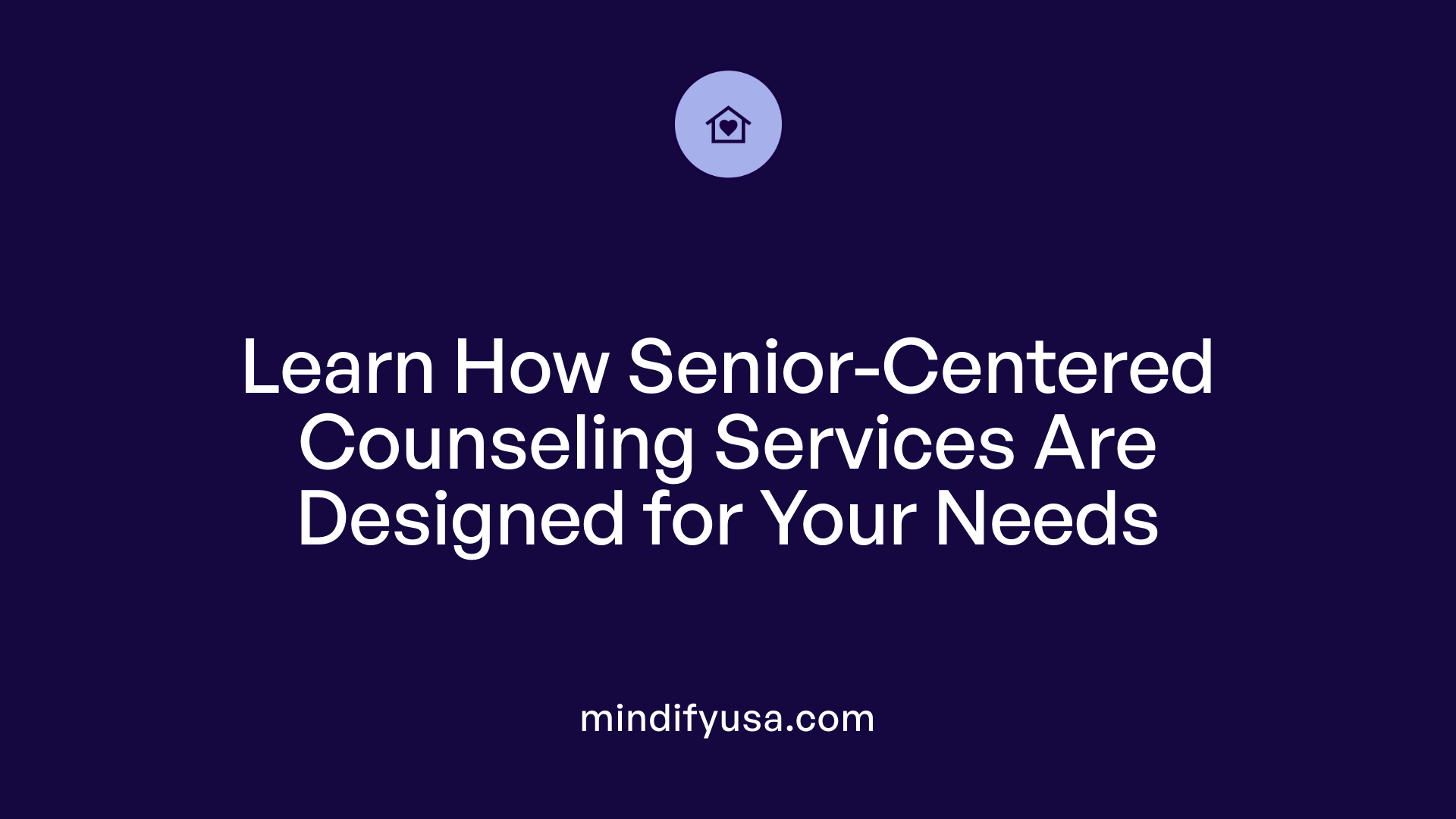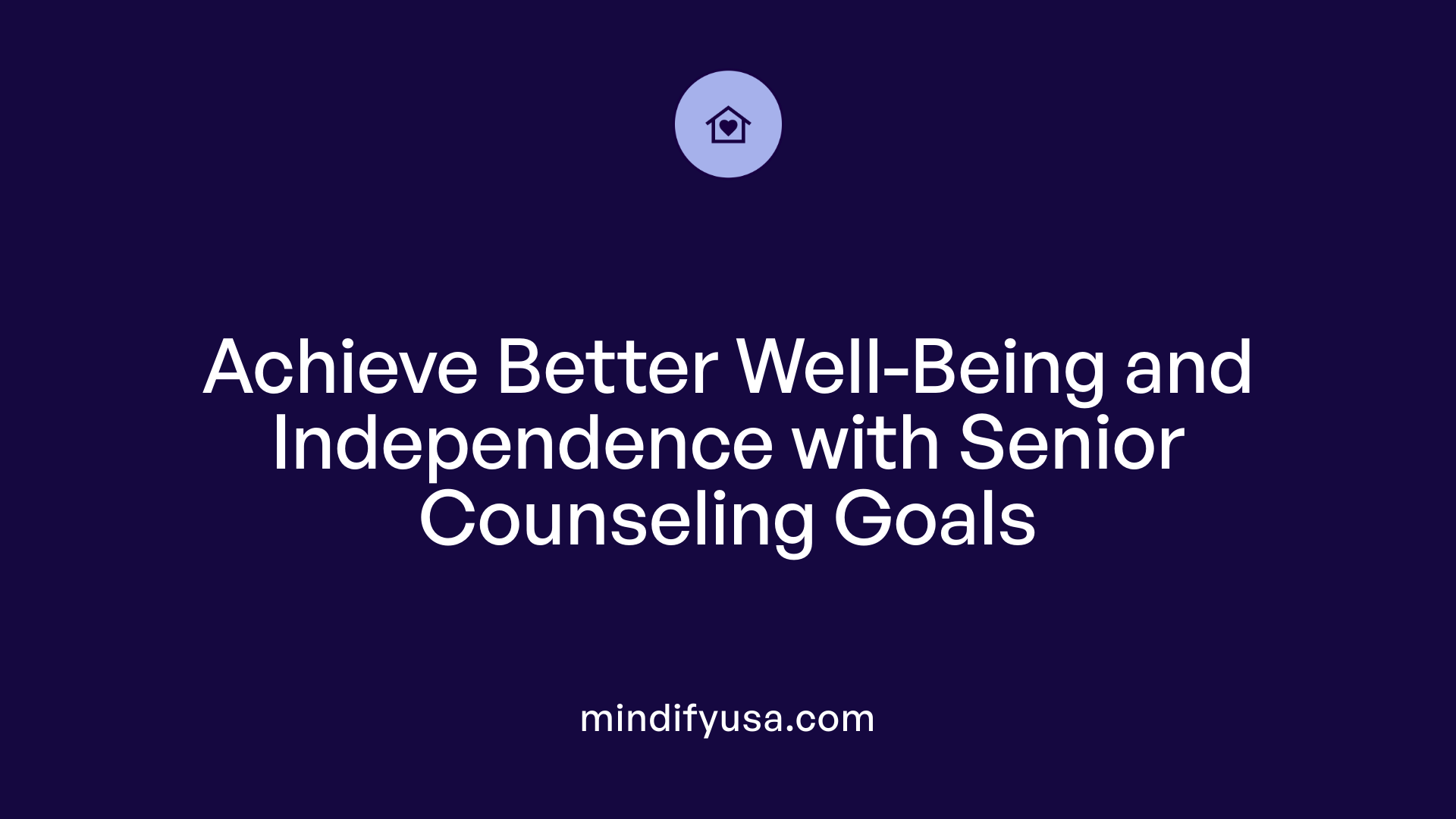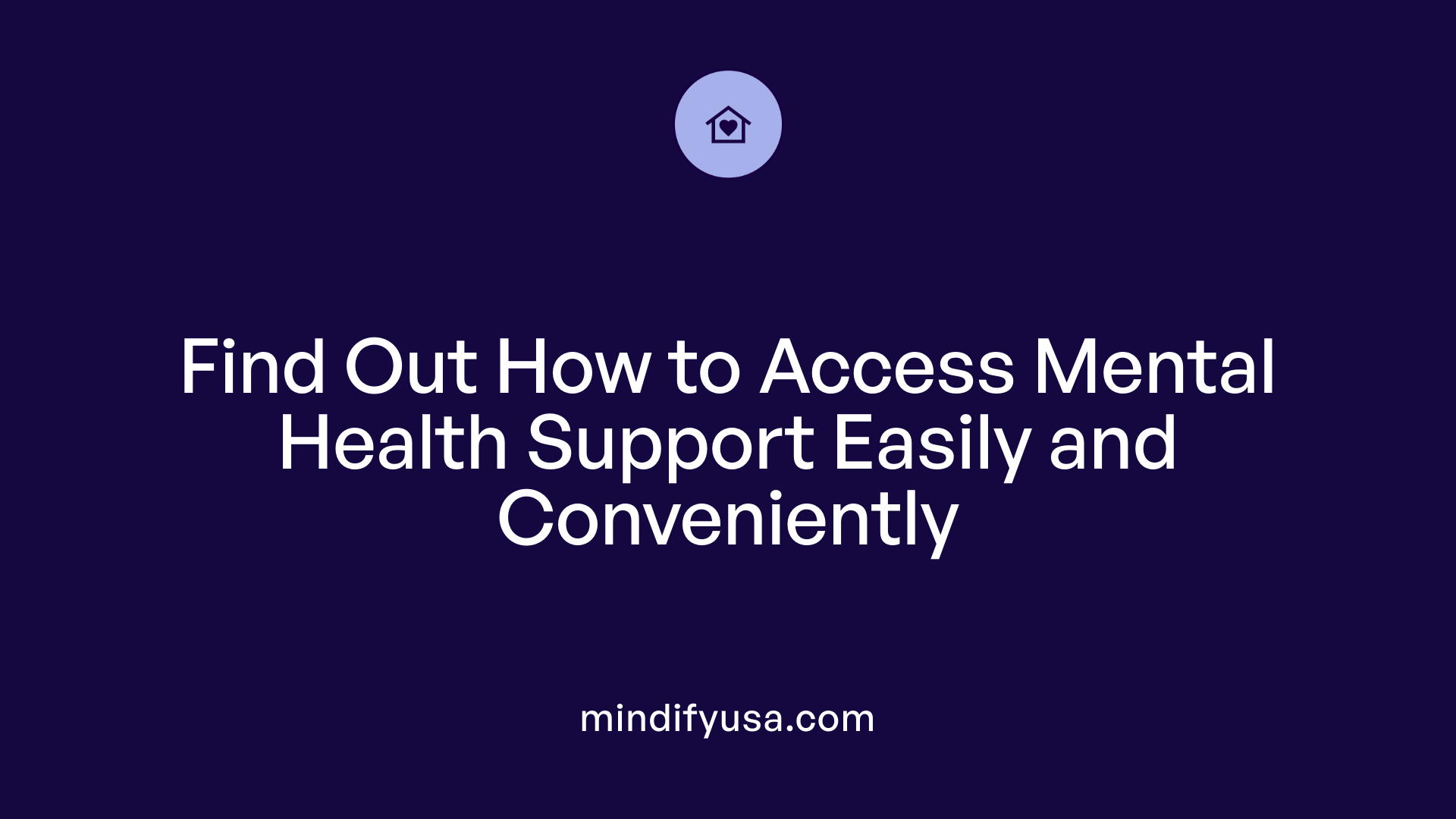Enhancing Mental Health for Older Adults through Specialized Counseling
As the population ages, the importance of accessible, senior-specific mental health services continues to grow. Mindify offers comprehensive counseling options designed to meet the unique needs of older adults, emphasizing accessibility, evidence-based practices, and holistic care. This overview explores the scope, benefits, approaches, and relevance of senior-focused counseling, demonstrating how these services foster resilience, improve quality of life, and support healthy aging.
Range of Counseling Services for Seniors
 Counseling services tailored to seniors play a vital role in addressing the unique mental health needs associated with aging. These services are designed not only to manage common mental health issues like depression and anxiety but also to support seniors facing the challenges of cognitive decline, grief, and social isolation.
Counseling services tailored to seniors play a vital role in addressing the unique mental health needs associated with aging. These services are designed not only to manage common mental health issues like depression and anxiety but also to support seniors facing the challenges of cognitive decline, grief, and social isolation.
Many providers, such as Blue Moon Senior Counseling and Aging True, offer a combination of in-home visits, telehealth, and community-based sessions to ensure accessibility. This flexibility is especially important for seniors with mobility issues or those living in remote areas. In-home counseling allows mental health professionals to assess and address issues directly within the client's living environment, fostering comfort and trust.
Assessment and Diagnosis
Initial assessments and diagnosis form the foundation for effective treatment plans. Licensed mental health professionals conduct comprehensive evaluations to understand each senior’s physical, emotional, and cognitive status. These assessments help identify conditions such as depression, anxiety, early-stage dementia, or behavioral health challenges. Many organizations incorporate evidence-based tools like the PEARLS (Program to Encourage Active, Rewarding Lives for Seniors) and TIP 26 protocols to tailor interventions precisely.
Support for Chronic Conditions Like Dementia and Depression
Chronic conditions such as dementia and depression are common among seniors, requiring specialized intervention. Counseling approaches include Cognitive Behavioral Therapy adapted for cognitive impairments, mindfulness practices, and behavioral management techniques. For seniors with dementia or memory problems, therapies focus on maintaining quality of life, managing mood, and reducing behavioral symptoms.
Organizations like Northern Virginia Older Adult Counseling and Wekiva Springs Center provide programs that emphasize mood stabilization, behavioral management, and medication coordination when necessary. Support groups are also a valuable resource, offering community connection and shared experiences to reduce feelings of isolation.
Family and Support Group Therapy
Family involvement is crucial in elder mental health care. Many services incorporate family and support group therapy to improve communication, address relationship conflicts, and foster a supportive environment. These sessions help family members understand their loved ones' experiences, learn effective caregiving strategies, and prevent caregiver burnout.
Support groups give seniors a platform to share their feelings and challenges with peers, promoting emotional resilience. These groups are often facilitated by trained therapists and are available both in physical community settings and virtually, ensuring wide accessibility.
| Service Type | Description | Beneficiaries | Delivery Method |
|---|---|---|---|
| In-home counseling | Personalized mental health services at the client’s residence | Seniors with mobility challenges | Home visits, virtual sessions |
| Virtual therapy | Remote mental health counseling through secure platforms | Tech-savvy seniors and those in rural areas | Telehealth |
| Assessment & diagnosis | Comprehensive evaluations by trained professionals | All seniors seeking mental health support | In-person, virtual |
| Chronic condition support | Specialized therapies for dementia, depression | Seniors with cognitive or mood disorders | In-home, community programs |
| Family & group therapy | Family sessions, peer support groups | Families and seniors | In-person, virtual |
Overall, senior mental health services are evolving to be more accessible, personalized, and comprehensive. By combining in-home visits, virtual options, targeted interventions, and family involvement, these services aim to improve quality of life, maintain independence, and promote emotional well-being among older adults.
Approaches and Methodologies in Senior Counseling

What approaches and methodologies are used in counseling for older adults?
Counseling for older adults employs a variety of adapted therapeutic approaches that are supported by evidence for their effectiveness in alleviating depression and anxiety. Common methodologies include cognitive-behavioral therapy (CBT), reminiscence therapy, life review therapy, interpersonal therapy (IPT), and problem-solving therapy.
These approaches are often tailored to address age-related challenges such as grief, medical conditions, social isolation, and cognitive decline. Practitioners modify the pace and focus of therapy to meet the needs of older clients, ensuring interventions are accessible and relevant.
In addition to individual therapies, holistic and community-based models are widely used. These incorporate social support, group therapy, and interdisciplinary approaches to promote resilience, well-being, and independence among seniors.
Specialized interventions like music therapy, art therapy, animal-assisted therapy, and exercise programs are also integrated to support mental health. These creative therapies aid emotional expression, cognitive stimulation, and physical activity, all of which are crucial for overall wellness.
Furthermore, culturally responsive practices and environmental considerations are emphasized to tailor treatments to diverse aging populations. Many organizations also integrate psychosocial support within medical care, recognizing the complex needs that come with aging, including mental, physical, and social health considerations.
How do these methodologies enhance mental health outcomes for seniors?
These adapted therapeutic methodologies significantly enhance mental health outcomes for seniors by effectively addressing common issues such as depression, anxiety, and cognitive decline. Techniques like reminiscence therapy and life review therapy help older adults reflect on their lives, fostering a sense of purpose, satisfaction, and emotional resilience.
Community-based and holistic approaches promote social engagement, physical activity, and cultural relevance, which are essential elements for mental well-being in later life. By encouraging participation in social and group activities, these models reduce feelings of loneliness and isolation.
Creative therapies—such as art, music, and animal-assisted therapy—not only stimulate emotional expression but also improve mood and cognitive functioning. These interventions support emotional resilience by providing enjoyable avenues for self-expression and cognitive engagement.
Personalized treatment plans that adjust the therapy pace and content to resonate with individual experiences ensure higher patient engagement and adherence. This customization maximizes the therapeutic benefits, leading to longer-lasting improvements in mental health.
Overall, the integration of these methodologies within senior counseling helps foster a supportive environment where older adults can maintain dignity, independence, and emotional well-being, ultimately improving their quality of life.
Relevance and Suitability of Senior-Centered Services

How are counseling services tailored to be relevant and suitable for elderly individuals?
Counseling services designed for seniors focus on addressing the unique mental health and emotional challenges faced by older adults. These services specifically target age-related issues such as grief from the loss of loved ones, managing chronic health conditions, coping with cognitive decline, and emotional distress associated with aging. Experts often employ evidence-based interventions like psychosocial support, cognitive-behavioral therapy (CBT), and screening tools for substance use to ensure effective care.
Specialized programs such as PEARLS (Program to Encourage Active, Rewarding Lives for Seniors) and Healthy IDEAS are frequently incorporated into treatment plans. These programs help alleviate late-life depression, promote social engagement, and support behavioral health. Protocols like TIP 26, which guide mental health treatments in older adults, are implemented to tailor therapies effectively.
Accessibility is a core element, with services delivered in various settings—including the individual's home, community centers, assisted living facilities, or via telehealth platforms—to accommodate mobility issues or health concerns. This flexibility ensures that seniors receive care without the burdens of transportation and physical limitations.
A multidisciplinary care approach is commonly utilized, involving team members such as psychiatrists, clinical social workers, nurses, family therapists, and caregivers. This collaborative effort ensures comprehensive treatment that considers medical, psychological, and social factors. Care plans are individualized, emphasizing respect for the seniors’ life experiences and cultural backgrounds.
Moreover, training and resources are provided to healthcare providers to enhance their understanding of geriatric mental health. Culturally sensitive practices are prioritized to respect diverse backgrounds and preferences, fostering trust and positive engagement.
Overall, senior-oriented counseling is structured to be relevant, respectful, and effective, promoting independence, dignity, and improved quality of life for older adults. The integration of evidence-based protocols, tailored settings, and multidisciplinary teams guarantees that mental health services are both accessible and appropriate for the aging population, supporting their well-being through personalized and compassionate care.
Objectives and Outcomes of Senior-Focused Counseling

What are the main objectives of senior-focused counseling?
Senior-focused counseling aims to support emotional resilience and overall mental well-being in older adults. Its primary goal is to facilitate a meaningful, balanced life by helping seniors process grief, cope with health-related changes, and navigate significant life transitions such as retirement or relocation. Therapy often encourages self-awareness and reconnects individuals with their core values, fostering behaviors that promote purpose and fulfillment despite age-related challenges.
Another important aim is to strengthen relationships and social engagement. Many programs focus on reducing feelings of loneliness and social isolation by providing opportunities for meaningful interaction. Supportive counseling helps older adults develop coping skills, manage mental health conditions like depression and anxiety, and maintain cognitive health.
Ultimately, senior-focused therapy seeks to empower older adults to live purposefully, adapt to life’s changes with acceptance, and sustain emotional and cognitive functioning. These efforts improve their quality of life, promote independence, and help them find new sources of joy and connection.
What types of services are provided to older adults through senior-focused counseling?
Older adults benefiting from senior-focused counseling can access a wide array of mental health services. These include individual therapy sessions tailored to address depression, anxiety, mood disorders, and cognitive decline. Evidence-based approaches such as cognitive-behavioral therapy (CBT), reminiscence therapy, and problem-solving therapy are frequently utilized.
Many community organizations and health providers offer in-home counseling, especially vital for seniors experiencing loneliness or mobility limitations. Specialty geropsychiatric services are available for mood and cognitive issues, often integrated with medical care.
Support networks extend through crisis helplines such as the Friendship Line, which offers emotional support and check-ins, and CalHOPE, providing peer counseling and crisis intervention.
Additional services include support groups that facilitate social connections, education programs for caregivers, and cognitive training exercises. Some programs incorporate therapy modalities like music or art therapy, and physical activities such as chair yoga, to enhance mental and physical health.
In summary, senior-centric counseling combines targeted psychological interventions with community and home-based services to improve mental health and support aging individuals’ independence and happiness.
| Service Type | Description | Additional Details |
|---|---|---|
| Individual Therapy | Tailored sessions for depression, anxiety, and cognitive decline | Often includes CBT, reminiscence therapy |
| Group Support | Facilitated peer groups to foster social engagement | Addresses loneliness, shared experiences |
| In-Home Counseling | Therapy delivered at the client’s residence | Especially for mobility or health issues |
| Crisis Support | Immediate emotional assistance via hotlines | Friendship Line, CalHOPE |
| Activity-Based Therapy | Music, art, or physical activities | Enhances cognitive and emotional health |
| Caregiver Support | Training and counseling for caregivers | Reduces caregiver stress, improves care quality |
This comprehensive approach ensures that older adults receive personalized and accessible mental health care, tailored to their unique needs and circumstances, ultimately supporting their dignity, independence, and emotional fulfillment.
Effective Access Strategies for Seniors

How can seniors access counseling support effectively?
Seniors seeking mental health and counseling support can maximize their access by leveraging resources from healthcare providers. Many seniors already have Medicare, which often covers a range of mental health services including counseling provided by licensed professionals. Using Medicare Provider Compare can help locate qualified mental health practitioners close to their homes.
Community-based programs also play a vital role. For example, organizations like Family Eldercare offer in-home counseling and virtual talk therapy, making mental health support accessible for those who are homebound. Aging True and NSSC provide in-home assessments, therapy, and caregiver support, especially tailored for seniors with cognitive impairments or emotional distress.
Online and telehealth services have become increasingly vital, particularly during situations like the COVID-19 pandemic. Many organizations, including Midwestern University and Wekiva Springs Center, offer virtual appointments with licensed therapists. Teletherapy offers flexibility, allowing seniors to receive care from the comfort of their own homes without needing to travel.
Community programs and peer support networks provide additional avenues for emotional support. Peer-led groups or community centers like the UCLA Longevity Center’s Memory Fitness Program and the Salt Lake Community College counseling services enable seniors to access group therapy, educational workshops, and support groups. These environments foster social interaction and shared understanding, crucial for mental health.
For urgent mental health crises, seniors should be aware of emergency helplines such as the 988 Lifeline or contacting emergency services like 911. Crisis helplines offer immediate support and can connect individuals to necessary ongoing services.
Lastly, resource guides, online directories, and local senior centers serve as comprehensive tools to help seniors identify available services. Support networks such as the Alzheimer’s Association, local senior centers, and state health departments publish guides that provide details on available counseling options, mental health hotlines, and community programs.
In summary, effective access to mental health care for seniors involves a combination of utilizing healthcare provider resources, engaging with virtual and in-person counseling options, participating in community programs, and knowing how to reach emergency services. Staying informed through resource guides and support networks is essential to navigate the options and find suitable mental health care.
Fostering Independence and Well-Being in Older Adults
Mindify’s senior-centered counseling programs exemplify a dedicated effort to improve mental health outcomes among the elderly by providing accessible, relevant, and compassionate care. Employing evidence-based therapies and tailored approaches, these services support independence, resilience, and emotional stability, ensuring seniors can navigate aging with dignity, purpose, and vitality. As awareness and availability expand, the importance of integrating such specialized counseling into broader health and community frameworks becomes increasingly clear, paving the way for a healthier, more supported aging population.
References
- In-Home Counseling - Family Eldercare
- Lower Merion Counseling & Mobile Services
- Integrity Senior Services, Clinical Social Work/Therapist, New York ...
- Aurora Family Service Care & Counseling
- Counseling Services - SLCC
- Mental Wellness – In Home Senior Care Northeast Florida
- Counseling Services - CJE SeniorLife
- Senior Counseling in Florida
- In-home Mental Health Counseling - Integrity Senior Services
- Counseling Services | Midwestern University






































































































